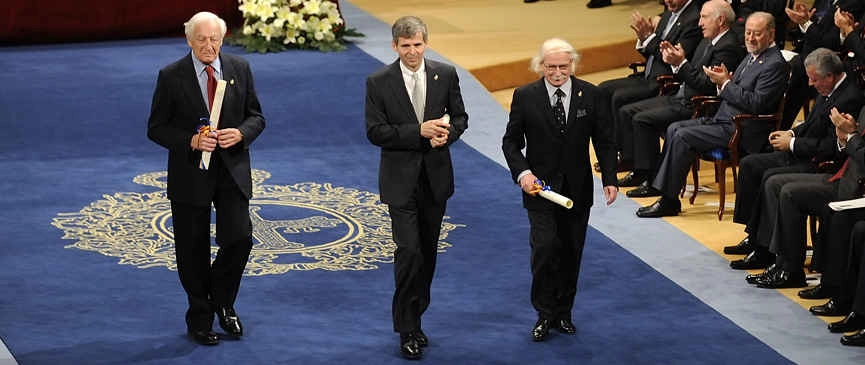Main content
Joseph Altman, Arturo Álvarez-Buylla and Giacomo Rizzolatti Prince of Asturias Award for Technical & Scientific Research 2011

At its meeting in Oviedo, the Jury for the 2011 Prince of Asturias Award for Technical and Scientific Research, made up of Mr. Juan Luis Arsuaga Ferreras, Mr. Pedro Miguel Echenique Landiríbar, Mr. Antonio Fernández-Rañada Menéndez de Luarca, Mr. Luis Fernández-Vega Sanz, Mr. Vicente Gotor Santamaría, Mr. Santiago Grisolía García, Ms. María del Rosario Heras Celemín, Mr. Bernardo Hernández González, Ms. Petra Mateos-Aparicio Morales, Mr. Amador Menéndez Velázquez, Mr. Rafael Nájera Morrondo, Mr. César Nombela Cano, Ms. Ana Pastor Julián, Mr. Eduardo Punset Casals, Mr. Julio Rodríguez Villanueva, Mr. Manuel Toharia Cortés, chaired by Mr. Enrique Moreno González and with Mr. José Antonio Martínez Álvarez acting as secretary, has unanimously decided to bestow the 2011 Prince of Asturias Award for Technical and Scientific Research on Joseph Altman, Arturo Alvarez-Buylla and Giacomo Rizzolatti for discovering the regeneration of neurons in adult brains –a process known as neurogenesis– and mirror neurons.
Joseph Altman discovered neurogenesis in adult mammals in the 1960’s, suggesting that these new neurons play a crucial role in the processes of memory and learning. This discovery provides support for the concept of cerebral plasticity.
Arturo Alvarez-Buylla identified the fundamental mechanisms inherent to neurogenesis and glial cells as the progenitors of new neurons, as well as the chain migration of the latter to different areas of the brain. This has likewise provided new clues as to the origin of brain tumours.
Giacomo Rizzolatti discovered mirror neurons, which are activated not only during the performing of an action, but also during its observation and provide a suitable framework for the understanding of the mechanisms underlying emotional empathy, imitation, communication and our social behaviour.
The discoveries of these three researchers are among the most important in Neurobiology since the times of Professor Santiago Ramón y Cajal, changing our way of understanding the brain. This body of research opens up new pathways for treating neurodegenerative disorders such as Alzheimer’s disease and Parkinson’s disease, as well as for the understanding and possible treatment of autism.
Oviedo, 25th May 2011
End of main content
